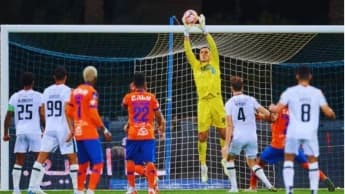Brighton Triumphs Amid Controversy Over Baleba's Red Card

Brighton’s gritty 2-1 win over Bournemouth was marred by controversy after Carlos Baleba’s contentious red card. Former referee Keith Hackett criticizes the decision, highlighting the impact of player theatrics on officiating standards in football.
Brighton's 2-1 win against Bournemouth was marred by controversy, particularly when Carlos Baleba received a second yellow card and was sent off in the 59th minute. This decision left Brighton playing with 10 men for the rest of the match and has been deemed 'extremely harsh' by former PGMOL chief Keith Hackett. With decades of top-tier refereeing experience, Hackett expressed his opinions to Football Insider, raising questions about the legitimacy of the second yellow card and the impact of player dramatics on referee decisions.
The incident arose when Baleba, a 20-year-old midfielder for Brighton, collided with Bournemouth's Milos Kerkez during a typically intense Premier League encounter. While the first yellow card issued to Baleba was widely accepted, Hackett contends that the second yellow card was unfair and preventable. From Hackett's viewpoint, the decision was excessively harsh, especially given the context of the match—Brighton was already facing significant pressure while trying to maintain a one-goal lead.
“I believe this was not a second yellow card,” Hackett stated. “The first card was justified, but the second one was overly severe and should not have been issued. The dramatics from the player on the ground did not assist the referee in making his decision.”
Hackett's analysis highlights a persistent problem in contemporary football: the propensity for players to overstate their injuries to influence referees. He argues that such theatrics complicate the decision-making process for officials, which can result in erroneous decisions, as was evident in this instance.
Even after being reduced to 10 players, Brighton showcased remarkable resilience, successfully maintaining their lead and claiming all three points. This victory propelled them to fifth place in the Premier League standings, marking a significant accomplishment for Roberto De Zerbi's team. The Seagulls' skill in managing the remainder of the match with a numerical disadvantage highlights their tactical discipline and dedication.
Although the referee's choice might have sparked discussions after the match, Brighton's display, especially in managing Baleba's dismissal, warrants praise. This outcome highlighted the resilience of their squad and their steady progression in the Premier League.
This event highlights the delicate balance that referees must maintain during high-pressure matches. The urgency to make immediate decisions, often relying solely on the visual signals from players and the responses of those nearby, can result in controversies such as this one. Nevertheless, the imperative to minimize such exaggerations is vital for upholding the integrity of the sport.
Although Hackett's opinions are not fully embraced by everyone, his vast experience in officiating gives credibility to his perspective. As the Premier League progresses, the significance of referees and their decision-making processes will undoubtedly attract the attention of both fans and analysts. For Brighton, this victory will be remembered not for the controversy, but for their resilience in securing a result despite facing adversity.
Ultimately, the Seagulls claimed victory, yet the discussion persists: was Baleba's red card genuinely justified? This is a conversation that is expected to resonate within the world of football for weeks ahead.






